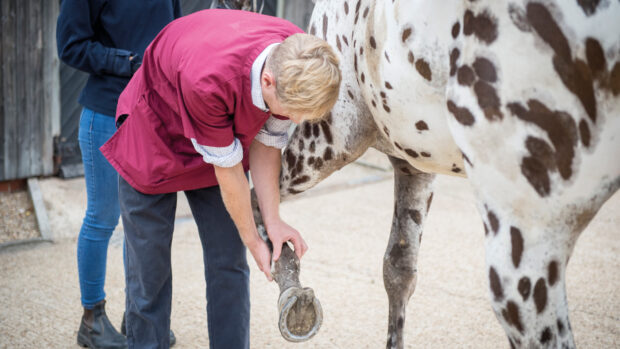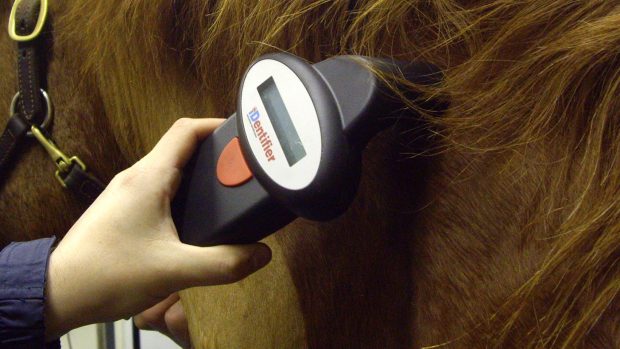A vet who kicked and swore at a horse who had kicked him has been reprimanded and given a formal warning after he made “heartfelt apologies” for his behaviour.
The Royal College of Veterinary Surgeons (RCVS) disciplinary committee has published its findings and sanctions in relation to equine vet Samuel Hutton, a sole practitioner as Sheffield-based Hutton Equine Limited, and an incident in February 2021.
The charge said that a horse called Angel kicked Mr Hutton, while he was examining her at a livery yard in Sheffield, and that he kicked her back, in the abdomen. Mr Hutton admitted the kick, and made “heartfelt apologies”.
Angel’s owner, Ms A, said she had bought the mare in November 2020 and Mr Hutton had vaccinated her twice. In January 2021, Ms A moved Angel to another livery yard, after which the mare’s behaviour changed and she seemed uncomfortable.
The committee heard Ms A spoke to Mr Hutton and he suggested a five-stage vetting but she thought Angel was “protective of her back legs”, and so might not tolerate the examination. Ms A said another person suggested the mare might be pregnant, so she asked Mr Hutton to test her. She said during the rectal examination, she and Mr Hutton were in the stable, and Mr Hutton’s partner and two others outside.
“Ms A stated that Mr Hutton had administered a sedative to the horse and afterward performed a rectal examination,” the disciplinary panel report states. “They then lifted Angel’s feet, Ms A lifting the front right and back right. Ms A stated that Mr Hutton then lifted Angel’s left hind leg and whilst this was happening, Angel kicked out, striking Mr Hutton on his leg.
“Ms A said that Mr Hutton moved forward and punched Angel’s backside slightly, then stepped back and swore. She stated that he then ran up and kicked Angel once on her belly, using the sole of his shoe. Ms A angrily asked Mr Hutton to leave the stable.”
Mr Gliddon, an expert called by the RCVS, “agreed that attitudes to physical reprimands had changed over time”, the report states.
“In his report he stated that a reprimand administered by a veterinary surgeon that may have been considered acceptable by a significant body of the veterinary profession some decades ago, would no longer be regarded as such now, in his opinion. In re-examination, he stated that, in his opinion, there was not a reasonable body of veterinary opinion which would consider kicking a horse as an acceptable [way to discourage undesirable] behaviour. He said that it would not be good for the welfare of animals. If the general public thought that vets were using kicking as a means of [discouraging undesirable behaviour], its opinion of the profession would not be as high as currently. He agreed that some methods of physical restraint involved discomfort to the animal.”
Mr Hutton said the rectal examination was uneventful, after which Ms A asked if “we” could try picking up Angel’s feet. He said after she had lifted the right feet, he lifted the left hind, held it up for about five seconds, then put it down.
“Mr Hutton stated that he had stepped back when Angel suddenly kicked out with her left leg,” the report states. “He was hit very hard just above the left knee. Mr Hutton said he was shocked and in pain. Mr Hutton said he had pushed himself off Angel, stepped back, steadied himself by putting his hand on the stable wall, and then moved towards Angel and kicked her once using the top side of the toes of the right foot. He said this had occurred a matter of seconds after the horse kick and had been an instinctive action.
“As well as an instinctive reaction, Mr Hutton felt that an immediate reprimand following a serious misdemeanour was something a horse would understand and was appropriate. He stated that Ms A’s reaction had been to reassure the horse and she had not appeared to have been concerned about him.
Apology
“In the hearing, Mr Hutton apologised for the incident with Angel. He said it had happened in the heat of the moment. He wished that he had apologised straight away.”
Mr Hutton did not agree that Ms A had told him to be careful when lifting Angel’s hind feet; he remembered Ms A saying the mare was “not that bad”.
“Mr Hutton said that after the kick he had not punched Angel but had pushed himself away,” the report states. “He apologised that he had sworn. He denied using the sole of his foot to kick Angel. Mr Hutton agreed he should have thought about it before kicking Angel. He said he would not have kicked Angel, if he had thought about it. He did not think that he was acting in self-defence and accepted that after he had stepped back following Angel’s kick, he had put himself in a safe place.”
Mr Tremaine, the expert called by Mr Hutton, said large animals can cause severe injuries with kicks, which “would result in shock, severe pain, rapid assessment of one’s own injuries and possible relief if there were none”.
“Mr Tremaine stated that the kick had been an inappropriate action,” the report states. “However, he stated, the single lapse of professionalism, even if irrational, was not serious professional misconduct. He did not condone or defend physical reprimand in the form of a kick, but he accepted the rationale behind physical reprimands as a behaviour-modifying tool in a situation such as led to Mr Hutton’s response. He felt that Mr Hutton may have been insufficiently warned by Ms A about Angel’s behaviour.”
The committee heard that there was no evidence of Mr Hutton having kicked other animals, nor that this was his instinctive reaction.
“The committee bore in mind that the events had occurred suddenly and unexpectedly,” the report states. “The committee took into account Mr Hutton’s previous good character as supporting his credibility when assessing his evidence.”
The committee found that Mr Hutton had pushed himself away from Angel rather than punching her, and that the kick came “after a gap in time, albeit brief”.
Mr Hutton said the kick had occurred in “an emotional haze”, that he had not been thinking straight and that it had been a natural reaction to having just been kicked. He said his reaction related to things he had learned 20 years ago, and he “realised now it was ‘not the way forward’.”
“In the last two years, he said he had learned to be more controlled.”
The committee found Mr Hutton had made a conscious decision to kick the horse, although noting his description of his state of mind, and that he had been in pain. It accepted that the kick was an “isolated incident” and took into account testimonials provided, which “indicated that Mr Hutton is capable of dealing with horses, including those with difficult temperaments, very well”.
Committee chair Judith Way said: “The committee determined that taking all circumstances and its findings into account, this conduct was a single, but serious failure on the part of Mr Hutton and found the facts proved amounted to disgraceful conduct in a professional respect.”
In determining sanction, the committee heard from character witnesses, who said Mr Hutton had an “excellent approach to horse welfare”, “never lost his cool”, even handling challenging horses, and was “pleasant, straightforward and truthful”. The committee also considered testimonials from 41 character witnesses.
The committee heard there was “no actual harm” to animal or human, and no financial gain, and found that Mr Hutton had since “sought appropriate training” and “demonstrated insight” by acknowledging his inappropriate action. He had an “unblemished” record, and the committee considered it relevant that, at the time he had been kicked, Mr Hutton had been concerned about a previous injury to his other leg, which “played on his mind when Angel kicked him”.
The committee found that “in light of Mr Hutton’s admissions, heartfelt apologies, developing insight and the testimonial evidence, that he is very unlikely to repeat his past misconduct”.
“It was clear that this had been a singular aberration by an otherwise competent and caring veterinary surgeon of long standing,” the report states.
The committee issued a reprimand and a formal warning.
“It has determined that this would be proportionate and sufficient to provide adequate protection for animals and maintain public confidence in the profession,” Mrs Way said.
Mr Hutton declined to comment further when approached by H&H.
You might also be interested in:

Subscribe to Horse & Hound magazine today – and enjoy unlimited website access all year round
Horse & Hound magazine, out every Thursday, is packed with all the latest news and reports, as well as interviews, specials, nostalgia, vet and training advice. Find how you can enjoy the magazine delivered to your door every week, plus options to upgrade your subscription to access our online service that brings you breaking news and reports as well as other benefits.




